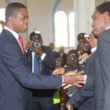The Economist Intelligence Unit (EIU) says Zambia will face substantial threats to its political stability during the 2018-2022 period due to President Edgar Lungu’s desire to prolong his stay in office.
And the EIU has observed that dialogue talks between President Lungu and opposition UPND leader Hakainde Hichilema are likely to be unsuccessful due to lack of common ground over the 2016 presidential elections.
According to the EIU country report, Zambia’s political stability from 2018 to 2022 was unpredictable.
“Zambia will face substantial threats to political stability in 2018-22. Much of this stems from what is for Zambia an unusual degree of tension under the presidency of Edgar Lungu. The treason charges against Hakainde Hichilema, leader of the UPND have only been dropped under a nolle prosequi, which means that the prosecution will proceed no further but that he can be re arraigned at any time. Mr Hichilema has also reiterated his commitment to overturning the results of the 2016 general election which he claims was fraudulent, even though these claims are the most likely reason why he was charged with treason in the first place. The Commonwealth has brokered talks between Mr Hichilema and Mr Lungu but in the absence of any common ground over the 2016 election, these talks are unlikely to succeed,” the report read.
The EIU observed that the 2021 election time would be yet another volatile period for the country due to President Lungu’s unwillingness to leave office.
The EIU projected that President Lungu could win the 2021 elections if the ConCourt deemed him eligible to stand again due to the odds stacked against the opposition political parties and a repressive political environment that they were subjected to.
“The 2021 election season will be another volatile period, during which the government will look to narrow the political space aggressively. Extra security powers should help to bolster overall stability, but they will nonetheless reinforce widespread perceptions that Zambia is staggering into autocracy, keeping tensions very high throughout the forecast period and resulting in frequent low- level clashes and violence. Besides relations with the opposition, intra-governmental divisions will keep policy unpredictable, with a vocal conservative faction of the ruling Patriotic Front having long been skeptical of the president and his choice of cabinet. To cement his position, Mr Lungu is likely to enact a purge against this caucus, which will prove a distraction to the functioning of government while it lasts, but later on it should work to avoid internal instability. For example, in the run up to the 2020 PF presidential nomination,” the report read.
“The next presidential and legislative elections are due in August 2021. The most recent presidential and legislative polls, held in August 2016, were marred by violence primarily between security forces and opposition supporters as well as intimidation of media outlets and voices critical of the government. The violence and intimidation have injured Zambia’s image as one of Africa’s stronger democracies. Assuming that Mr Lungu is deemed eligible to stand again in 2021, and with the odds stacked against the opposition in a repressive environment, The Economist Intelligence Unit expects him to win a second full term as president.”
Meanwhile, the report stated that the country was likely to experience more political unrest should the courts rule that President Lungu is eligible to stand in 2021.
“Emergency security powers have been dropped, which will allow for calm over the short term despite low-level anti-government protests over corruption, which will be a frequent phenomenon. Over the longer run there are several potential flash points that stand to stir more serious unrest and provide justification for the reimposition or extension of emergency powers. Such unrest is likely to be triggered, for example, if the judiciary were to deem Mr Lungu eligible to stand for another term in office in 2021 something the opposition roundly rejects,” read the EIU report.












